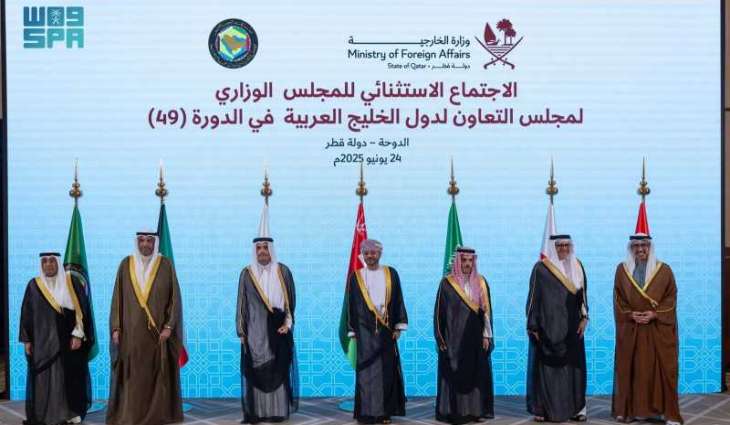Doha, June (پاکستان پوائنٹ نیوز 25 يونيو 2025ء) The meeting in Doha, Qatar, saw the participation of Saudi Minister of Foreign Affairs Prince Faisal bin Farhan bin Abdullah; United Arab Emirates Minister of Foreign Affairs Shaikh Abdullah bin Zayed Al Nahyan; Bahraini Minister of Foreign Affairs Dr Abdullatif bin Rashid Al Zayani; Oman's Minister of Foreign Affairs Sayyid Badr bin Hamad bin Hamoud Al Busaidi; Qatar's Prime Minister and Minister of Foreign Affairs Shaikh Mohammed bin Abdulrahman bin Jassim Al Thani; and GCC Secretary-General Jasem Mohamed Albudaiwi.
The meeting focused on the Iranian missile attacks that targeted the State of Qatar on Monday, and the following was reached:
The GCC Ministerial Council expressed its deep regret and strong condemnation of the missile attacks carried out by the Islamic Republic of Iran targeting a military base in the State of Qatar. This constitutes a blatant, unacceptable, and dangerous Iranian violation of the State of Qatar's sovereignty and airspace, as well as the principles of good neighborliness. It also constitutes a clear violation of international law and the United Nations Charter, regardless of the pretexts and justifications. The council expressed its full solidarity with the State of Qatar and its full support for the measures it takes to protect its security and stability.
The council condemned the continued Israeli aggression in the Gaza Strip and the killing of civilians, affirming its rejection of the military escalation carried out by the occupying authorities in the north and south of the Gaza Strip, the expansion of their occupation of large parts of the enclave, and the prevention of relevant international organizations from delivering humanitarian aid and operating medical facilities. The council stressed the need to resume negotiations to reach a ceasefire and provide assistance to civilians.
The council commended the competencies of the Qatari Armed Forces in confronting the attack launched by Iran on the State of Qatar, emphasizing that the security and stability of the State of Qatar is an integral part of the security and stability of all GCC states, and that any threat to any member state is a direct threat to all GCC states. The council reiterated its categorical rejection of any infringement on the sovereignty of the State of Qatar or any threat to its security and stability.
The council emphasized the need to adhere to the foundations and principles based on the United Nations Charter and international law, the principles of good neighborliness, respect for the sovereignty of states, non-interference in internal affairs, resolving disputes by peaceful means, and refraining from the use or threat of force.
The council welcomed the ceasefire announcement by U.S. President Donald Trump, stressing the need for an immediate cessation of all military operations. It commended the State of Qatar's efforts to mediate and achieve a ceasefire to maintain security and stability in the region. It commended the concerted efforts of all parties to take hold of the ceasefire to de-escalate tensions and adopt diplomacy as an effective means of settling disputes. It also called for maximum restraint, sparing the region and its peoples the dangers of war, and pushing for a serious return to negotiations leading to sustainable solutions, given the opportunities this moment presents to chart a new course toward a positive future for the region. The council affirmed its readiness to support all efforts in this regard.
The council commends the success of U.S. President Donald Trump in achieving a ceasefire between Iran and Israel and calls on him to exert efforts to achieve a permanent ceasefire in the Gaza Strip.
The council noted the content of the GCC Vision for Regional Security, announced in March 2024, regarding the priority of dialogue and diplomacy in relations between countries. It emphasized that this path is the only way to overcome current crises and preserve the security of the region and the peace of its peoples. The council emphasized that any escalation would undermine regional security and lead the region down perilous paths, with disastrous repercussions for international peace and security.
The council praised the role of the Sultanate of Oman in the U.S.-Iran nuclear negotiations. The council valued the role of the State of Qatar, the United States, and other countries that contributed to the de-escalation, emphasizing the importance of continuing effective mediation efforts.
The council stressed the importance of maintaining air, maritime, and waterway security in the region, and confronting activities that threaten the security and stability of the region and the world, including the targeting of commercial vessels, threats to maritime navigation routes, international trade, and oil facilities in GCC countries. The council also affirmed the commitment of the GCC countries to the stability of global energy markets.




